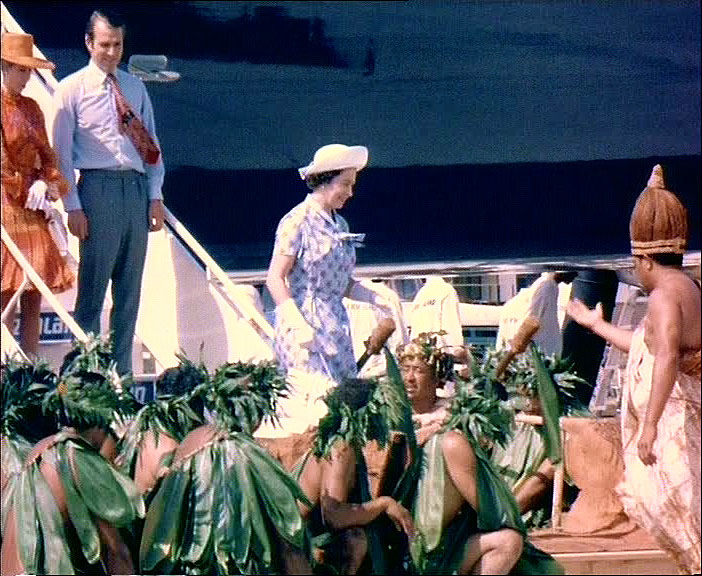Thomas Wynne: Separating the layers that bind us
Saturday 4 September 2021 | Written by Thomas Tarurongo Wynne | Published in Editorials, Opinion

Queen Elizabeth during her Rarotonga tour in 1974. 21090321
Anyone involved with politics in the Cook Islands knows how critical that first role is because anyone wanting to form a government in the Cook Islands has to have met with the Queen’s Representative first with a list of names and show a clear majority, writes Thomas Tarurongo Wynne.
If papa’a actually means four layers of clothing or four layers, then our move away or separation from those four layers since 1965 has been like taking a layer of clothing off, adjusting oneself, looking into that mirror and then asking again, what do I replace that layer with?
Or do I replace it at all?
We as a country have done that successively since the 1940s and continue to do that today.
In August, 1966, Albert Henry said the following: “Let us look at the people of the world and I will divide them into three sections. One group of people in the world have a monarchy as their backbone, that is one section. The second section of people in the world consists of those who had a royal heritage once but have allowed it to disappear and have adopted something different. Thirdly there are nations which from their inception did not have that royal heritage.”
The backbone he was referring to were our traditional leaders and I firmly believe they have a place in our society and democracy. The question being posed by them and for us to consider is how, and where?
Any ceremony in the Cook Islands is represented by this backbone that Albert Henry referred to and celebrated in Ma’uke or Akatokomanava this week at the investiture of Tararo Ariki. An island with strong links to my Tarurongo family with my great Uncle Tangata Tomo Ki Mitiaro Tarurongo (Tamaka) moving from Atiu to Ma’uke and marrying Vaine Elena Taimarangai and from where many of our Matapo relatives originate.
Our current Queen’s Representative Sir Tom Marsters has held the position since 2013 and yet its creation for us as a country as we understand it was not until 1982 with the Cook Islands Constitution amendment which finally separated the powers of the High Commissioner to New Zealand and our own Head of State representative. With that separation we formally brought to an end any powers of the New Zealand Government over our own.
From that date in 1982 it would take another two years before the appointment of our very own Queen’s Representative, Sir Tangaroa Tangaroa, then Sir Apenera Short, Sir Fred Goodwin and our incumbent Sir Tom Marsters.
It could be said that though we celebrate 1965 as our separation from New Zealand as a colony, at a Queen’s representative level it has only been the last 37 years where we as a country have had complete separation from New Zealand and interestingly, it was in 1982 also that we saw the change from the term Premier to Prime Minister, pointing again to yet another layer taken off and of separation from our colonial masters.
But unlike our colonial masters who have opted for a more politically neutral Head of State and Governor General, ours is quite different. Our Queen’s Representatives have since 1984 been decided upon by prime ministers and a Cabinet that have rewarded political legacies and service with Sir Tangaroa, Sir Apenera, Sir Fred and Sir Tom all coming from their respective political parties and backgrounds.
And in their powers, they exercise two very critical functions to our democracy – they appoint the Prime Minister and Cabinet, and chair the Cook Islands Executive Council.
Anyone involved with politics in the Cook Islands knows how critical that first role is because anyone wanting to form a government in the Cook Islands has to have met with the Queen’s Representative first with a list of names and show a clear majority.
With that in mind, if we consider the suggestion that the Head of State should come from the ranks of the House of Ariki, comes with its own set of challenges and again one of separation and neutrality.
What would it look like with a Kaumaiti as our Head of State instead of a retired politician, and would we see a neutrality our democracy has not yet experienced, or the same?
As we take off one layer of our colonial past, should we be mindful of what we replace it with?
And when we put on a new layer, should it be because of capacity and function rather than political favour and service?
The men who have served as Queen’s Representative in our country since 1984 have been some of our finest politicians and statesmen, and Sir Tom Marsters is one of our finest and one of the few who was there when our democracy was born in 1965.
The question I ask is, if we were to replace them from political ranks to the House of Ariki, what would that look like?
Would we see a separation of powers and of one of our key pillars further from the other, and would we as a democracy and a country be served any better than what we are today?














































